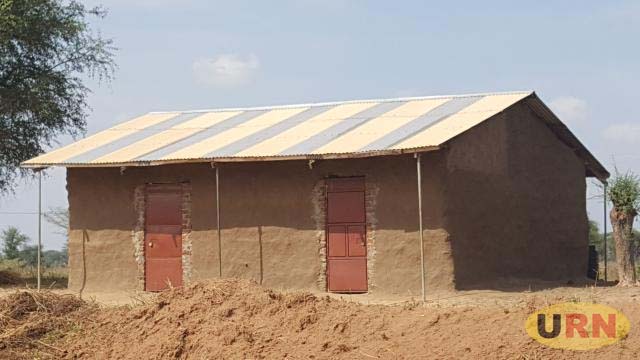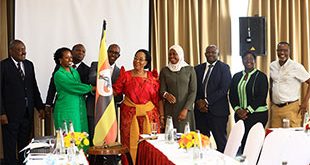
Kotido, Uganda | THE INDEPENDENT | Several Karamojong reformed warriors are stuck with the iron sheets distributed by the office of the prime minister after voluntarily surrendering their guns to the security forces.
In February 2024, the office of the Prime Minister launched the iron sheets distribution campaign, with the first consignment of 97552 iron sheets to be distributed to 3,752 beneficiaries across all nine districts of Karamoja. Several beneficiaries received the package, while some iron sheets are still at the sub-counties pending distribution.
The iron sheets are part of President Yoweri Museveni’s reward for the Karamojong warriors who voluntarily embrace peace and surrender guns to security forces.
However, since the Karachunas received the iron sheets, they have failed to construct the houses as per the purpose due to lack of money forcing other beneficiaries to sell off theirs to the people who can build.
John Robert Adupa, chairperson of the Lotisan sub-county said that the selection criteria for the beneficiaries was not followed well and most reformed warriors were left out.
Adupa said that the people who received the iron sheets resorted to selling them cheaply at a cost of between 20,000 and 25,000 shillings as they could not afford to build a house.
Adupa said that he has been intercepting several people transporting iron sheets to town for sale and others were already sold out to people who can construct the houses.
He also noted that the government sidelined sub-county leadership from the distribution exercise and it was managed by Resident District commissioners and Sub-county Chiefs.
He added that this made them take a back seat in monitoring the progress of the project.
Adupa revealed that they still have over 76 iron sheets kept from the sub-county pending distribution to the beneficiaries.
Joseph Onyang, the Sub-county chief of Katikekile Sub County said that they received1,995 ironsheets intended of the 35 beneficiaries identified by the committee.
Onyang noted that the security committee later outed their own reformed warriors and they were guided to distribute iron sheets to only 30 beneficiaries leaving out the five.
Onyang noted that the people who received the iron sheets revealed that they had no money to construct the houses. He added that only two people have constructed the houses as per the guide and the rest are still looking for resources to start the works.
Onyang said that they warned the beneficiaries against selling the iron sheets but he cannot confirm if they adhered to the guideline.
Felix Lochale, the LC5 chairperson of Karenga district observed that the majority of the Karachunas have not constructed any houses using iron sheets.
Lochale said that some of the beneficiaries are still looking for plots in the trading centers where they can build commercial houses for business.
Lochale noted that other beneficiaries are also stuck and they are waiting to sell produce to get some money to buy the building materials.
He observed that there were also attempts by a few individuals to sell the iron sheets but the police swung into the action.
Lochale said that the LC1 chairpersons have been advised to be alert and report any beneficiaries selling the iron sheets instead of utilizing them for their intended purpose.
Joseph Lobot, the LC5 chairperson of the Amudat district said that the government could have looked into other programs for empowerment than focusing on the iron sheets.
Lobot noted that although it was not a bad idea to give out the iron sheets, most of the beneficiaries were vulnerable and could not afford the other expenses such as buying the requisite building materials like timber, nails, bricks, and labor.
Lobot explained that most beneficiaries are stuck with the iron sheets because they do not have money to start the construction and this puts them into temptation to sell iron sheets to those who can build.
He also noted that the government has promised to support the beneficiaries with money for buying blocks and labor but it has not been fulfilled.
Lobot said that they expected by now the entire region to have been shining with the newly distributed iron sheets but unfortunately, the situation has remained the same as the community continues languishing in poverty.
Lobot reiterated that there is a need to have a wholesome program for empowerment and the issuing of iron sheets has not fully met expectations.
Paul Lokol, the LC5 chairperson of Nabilatuk district shared the same experience stating that several beneficiaries are still keeping the iron sheets while a few have tried constructing houses.
Lokol confirmed that there were no iron sheets mismanaged in his district but several beneficiaries may take longer to construct the houses because they lack capacity.
He said that they had selected beneficiaries who were capable of utilizing the iron sheets but there was some interference when the list was amended. The beneficiaries were not accessed and the majority were political agents for the area members of parliament.
Lokol said that the idea of supporting the beneficiaries with other materials would help to speed up the construction processes.
He noted that those who have built the houses include the opinion leaders, and women peace activists while the youths are still grappling with the limited resources.
****
URN
 The Independent Uganda: You get the Truth we Pay the Price
The Independent Uganda: You get the Truth we Pay the Price



